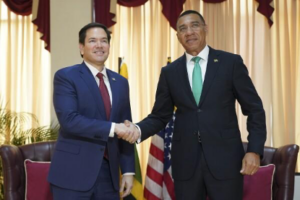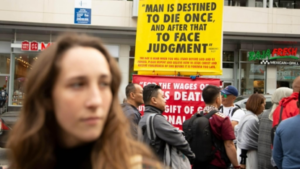Skirts are being lifted, and societies across the globe are being rocked by jaw-dropping scandals and astounding and unprecedented reports, much of them gripped in shame and disgrace.
It may be the best of times for some and the worst of times for others, but it is all God’s time and it is good.
As God would have it, embattled Prime Minister Andrew Holness left the island last Friday to attend the United Nations General Assembly in New York and to meet with members of the Jamaican diaspora in the area.
One wonders if the pertinent matter of the illicit enrichment investigations, which is dominating the public discourse, will be raised by the august international body or by members of the diaspora who contribute some US$3400 million to Jamaica’s national income annually.
Tongues have been wagging in a melodrama of Holness’ own making. The plot details the massive amounts of wealth the prime minister has managed to amass over the past few years. These mystery monies and other transactions are preventing his statutory declarations from being certified by the appointed anti-corruption body. While the investigations are to continue, the nation is demanding answers to myriads of swirling questions. The most important of them all is, “Where and how did the prime minister acquire his wealth?”
The United Nations seems to view Holness as a rising star of developing countries. He was a featured speaker at one of its caucuses over the weekend, and Jamaica will not forget how the current UN Secretary-General gave him a friendly back-pat on his visit to the island just over a year ago.
Perhaps, if Holness will not share the secret of his wealth with mouth-a-massy Jamaicans, he may choose to confide his well-guarded particulars, which the Integrity Commission has not been able to unearth after three years of digging, to his friend.
Since Holness’ political career started in 1997, when he became a member of parliament for West Central St. Andrew, he should be aware that the United Nations frowned on the matter of government corruption when, in 2003, it moved to combat the scourge that threatened to destabilise nations around the globe.
At that time, the United Nations brought together top researchers who studied cases of corruption among governments and found that vast quantities of assets were involved, particularly the theft of the resources of states. They found that there were tremendous links between corruption and other forms of crime, in particular, organized and economic crimes.
Corruption so threatened the political stability of countries that then United Nations Secretary-General Kofi Annan felt compelled to treat the issue as a transnational phenomenon that was cutting across cultures and affecting all societies and economies.
Convinced that the illicit acquisition of personal wealth could be damaging to democratic institutions, national economies, and the rule of law, Mr. Annan was determined to effectively prevent, detect, and deter international transfers of illicitly acquired assets and to strengthen international cooperation in asset recovery.
Jamaican and more than 190 other nations signed and ratified the UN anti-corruption convention at the time. The agreement noted that the prevention and eradication of corruption was the responsibility of all nations, and they must work together, with the support and involvement of individuals and groups outside the public sector. This includes civil society, non-governmental organisations, and community-based organisations to ensure effectiveness.
Coming out of the agreement, a network of corruption prevention mechanisms was initiated by the governments. In Jamaica, tough legislations were enacted and the Corruption Prevention Commission (Commission) was officially launched. The five-member Commission was chaired by a retired Supreme Court judge, Justice Chester Orr.
This Commission was an effort to strengthen the 1983 Act which established the Office of the Contractor General and gave more power to the first holder of that office, who was appointed in 1986.
Before the establishment of the Integrity Commission, the Office of the Contractor General (OCG) through its rigorous investigations and fearless reports, would bring corrupt politicians and other public servants to ultimate shame and disgrace in the public square, but no real sanction was enforced beyond that.
So feared was the OCG, that politicians agreed to defang and gag the dreaded entity under new rules and locked it away under the complex machinery called the Integrity Commission Act, 2017 (ICA).
The Integrity Commission, which is ruled by the ICA, has the very important duty to combat corruption through the development, implementation, and enforcement of anti-corruption legislation, policies, and initiatives.
The very impressively qualified, vastly experienced, and highly competent staff of the commission work with efficient systems, processes, and procedures despite the gag order and other limitations of its reach.
Being a signatory to the ambitious UN convention and making moves to strengthen the corruption prevention mechanisms did not stop corrupt politicians in Jamaica from plundering the public purse.
In too many countries, government accounts that are designated to fund the proper functioning of the education system, pay for basic public health care services, and provide vital support for the most vulnerable are starved of critical resources, which have been diverted to private pockets.
Running a score of 44 this year on the Corruption Perception Index, Jamaica is ranked 69 out of 180 countries, with 0 representing the most corruption and 100 signifying the least.
Back-to-back scandals involving government ministries, such as the Ministry of National Security, the Ministry of Transport, the Ministry of Science and Technology, the Ministry of Education, and others, have kept the nation locked in an unending mellow drama of highway robbery and deception by those elected to offices of trust. In this living theatre of the absurd, the antagonists face no consequence.
The Integrity Commission, which is ruled by the ICA, has a very important duty to combat corruption through the development, implementation, and enforcement of anti-corruption legislation, policies, and initiatives.
The very impressively qualified, vastly experienced, and highly competent staff of the commission work with efficient systems, processes, and procedures despite the gag order and other limitations of its reach.
Being a signatory to the ambitious UN convention and making moves to strengthen the corruption prevention mechanisms did not stop corrupt politicians in Jamaica from plundering the public purse.
In too many countries, government accounts that are designated to fund the proper functioning of the education system, pay for basic public health care services, and provide vital support for the most vulnerable are starved of critical resources, which have been diverted to private pockets.
Running a score of 44 this year on the Corruption Perception Index, Jamaica is ranked 69 out of 180 countries, with 0 representing the most corruption and 100 signifying the least.
Back-to-back scandals involving government ministries, such as the Ministry of National Security, the Ministry of Transport, the Ministry of Science and Technology, the Ministry of Education, and others, have kept the nation locked in an unending mellow drama of highway robbery and deception by those elected to offices of trust. In this living theatre of the absurd, the antagonists face no consequence.
The Auditor General and Contractor General have produced too many reports of project overruns, salaries overpaid, funds missing across ministries, and nepotism landing unqualified friends and families in high places, but no one is held to account.
Recently, again, the Auditor General sounded the alarm that, as a result of non-compliance, an independent assessment could not be made about how more than $1.6 trillion allocated to a number of government entities was utilised.
Among the violators failing to prepare and submit appropriation accounts were the ministries of Labour and Social Security, Education and Youth, and Health and Wellness, as well as the Office of the Prime Minister.
In the last 30 years, only one government minister has served jail time for misuse of public resources. Senator James A.G. Smith, former minister of labour and public service in the 1980s, remains the only Jamaican politician imprisoned for mismanaging public funds.
Jamaica must determine if the Integrity Commission, which includes the Auditor General and the Office of the Contractor General, will be allowed to defeat the corruption monster that has been gnawing away at our nation’s resources, the development of our nation, and the future of our children.
Know this: regardless of how things play out at the end of the investigations, the conclusion of the whole matter remains the same. God shall bring every work into judgement, with every secret thing, whether it be good or whether it be evil.






